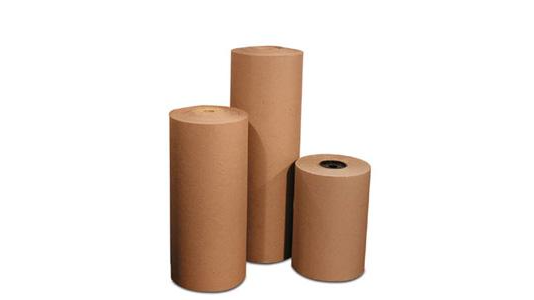How to Choose Sturdy Small Business Packaging: Why UK Companies Pick Kraft Paper
Key Takeaways:
- Kraft paper offers high tear resistance and burst strength, making it suitable for protecting products during shipping and handling.
- UK businesses are choosing kraft paper for its environmental benefits – it’s recyclable, biodegradable, and requires fewer chemicals to produce than alternatives.
- Pure kraft paper provides strong protection for heavy-duty applications, while recycled kraft offers a cost-effective solution for lighter packaging needs.
- The material’s natural brown colour and versatility make it suitable for industrial packaging and food applications when properly certified.
Small businesses across the UK are recognising what major packaging companies have known for decades: kraft paper delivers reliable performance at an affordable price. This brown paper, named after the German word for ‘strength’, has become the foundation of sustainable packaging solutions for companies facing both durability and environmental responsibility targets.
Why UK Businesses Choose Kraft Over Traditional Paper
The shift towards kraft paper isn’t just a trend. In fact, it’s a practical response to real business challenges. Traditional papers often fail under the pressures of modern shipping, leaving businesses dealing with damaged goods and unhappy customers. Kraft paper’s unique manufacturing process leads to a material far stronger than conventional paper alternatives.
Unlike standard papers that undergo extensive bleaching and chemical treatment, kraft paper retains its natural fibrous strength. This means fewer packaging failures, reduced replacement costs, and improved customer satisfaction. As such, pure kraft wrapping paper offers businesses a dependable solution for their packaging needs.
The economic advantages go way beyond initial cost savings. Many businesses report that kraft paper’s durability allows for occasional reuse, particularly in internal operations or for protective wrapping applications. That’s exactly why it’s such an intelligent investment for budget-conscious small businesses.
The Science Behind Kraft Paper’s Strong Durability
To understand why kraft paper performs so well, you’ll need to take a look at its unique structure and manufacturing process. The kraft pulping method creates a paper with distinct physical properties that set it apart from other packaging materials.
Long Fibre Structure Creates High Tear Resistance
Kraft paper’s strength comes from its long wood fibres, which stay largely intact during the manufacturing process. These extended fibres create a network of interwoven strands that resist tearing even under significant stress. When examining kraft paper under magnification, these long fibres appear like tiny ropes binding the material together.
The fibre length in kraft paper exceeds that found in recycled papers, directly translating to superior tear resistance. This makes kraft paper particularly valuable for wrapping irregularly shaped items or products with sharp edges that might puncture weaker materials.
High Burst Strength Withstands Shipping Pressure
Burst strength measures how much pressure a material can withstand before rupturing. Kraft paper consistently demonstrates strong burst strength ratings, often exceeding those of comparable-weight papers by significant margins. This characteristic is crucial during shipping when packages experience stacking pressure, handling stress, and transportation vibrations.
The high burst strength means kraft paper keeps its integrity even when protecting heavy items or when packages are stacked during storage and transport. Small businesses shipping books, tools, or other dense products will particularly benefit from this robust protection.
Reduced Chemical Processing Preserves Natural Strength
The kraft manufacturing process uses fewer harsh chemicals compared to other paper production methods, allowing the natural wood strength to remain largely preserved. The process uses sodium hydroxide and sodium sulfide, reducing lignin content while maintaining the paper’s structural integrity.
The result? A material that’s both strong and environmentally friendly. The reduced chemical processing also means that most production chemicals are recovered and reused – making kraft paper an environmentally responsible choice without sacrificing performance.
Types of Kraft Paper for Different Business Needs
Selecting the right kraft paper depends on understanding the specific demands of each application. Different grades offer varying levels of strength, cost-effectiveness, and specialised properties.
Pure Kraft for Heavy-Duty Applications
Pure kraft paper, made from 100% virgin wood pulp, represents the strongest option available. This unbleached material maintains its natural brown colour and offers maximum tear resistance and durability. Pure kraft is ideal for wrapping heavy machinery parts, protecting furniture during moves, or creating packaging for items requiring maximum protection.
The 100% virgin fibre content ensures consistent quality and performance, making pure kraft the preferred choice for businesses where packaging failure isn’t an option. Industries such as automotive parts suppliers and heavy equipment manufacturers frequently rely on pure kraft for their most demanding applications.
Recycled Kraft for Cost-Effective Solutions
Recycled kraft paper provides an economical alternative whilst maintaining reasonable strength characteristics. Made from reclaimed fibres, this option costs less than pure kraft whilst offering adequate protection for lighter products.
Small businesses shipping clothing, books, or non-fragile items often find recycled kraft meets their needs perfectly. The slightly reduced strength remains sufficient for most standard shipping applications, and the cost savings can significantly impact tight operating budgets.
Specialised Options: Waxed and Embossed Varieties
Waxed kraft paper combines traditional strength with moisture resistance, making it valuable for businesses dealing with damp conditions or products requiring grease protection. The wax coating on both sides maintains flexibility whilst adding a protective barrier.
Embossed kraft features a distinctive cross-hatched texture that improves strength while providing better grip during handling. This texture also creates additional air pockets that can improve cushioning properties, particularly valuable for protecting delicate items during shipping.
Environmental Benefits That Matter to UK Businesses
Environmental responsibility has become a significant factor in packaging decisions, with many UK customers actively choosing businesses that demonstrate sustainable practices. Kraft paper’s environmental profile offers compelling advantages over plastic and heavily processed paper alternatives.
Recyclable Material with Gradual Fibre Degradation
Kraft paper’s fibres can be recycled multiple times without significant quality loss, unlike many synthetic packaging materials that degrade rapidly or cannot be recycled at all. Each recycling cycle gradually shortens the fibres, but kraft paper typically maintains usable strength through several recycling cycles.
This extended recyclability means that kraft paper packaging contributes less waste to landfills over its complete lifecycle. UK businesses using kraft paper can confidently tell customers that their packaging supports circular economy principles.
Natural Decomposition Without Toxic Waste
When kraft paper reaches the end of its useful life, it decomposes naturally within weeks under normal environmental conditions. This decomposition produces no toxic residue, unlike plastic packaging that can persist for decades while releasing harmful microplastics.
The natural decomposition process actually enriches soil as the paper breaks down, making kraft paper packaging a positive contributor to environmental health rather than a burden. This characteristic particularly appeals to environmentally conscious consumers who increasingly scrutinise packaging choices.
Lower Chemical Usage Compared to Alternatives
Kraft paper production requires significantly fewer chemicals than bleached papers or plastic alternatives. The kraft process recovers and reuses most production chemicals, reducing both environmental impact and manufacturing costs. This efficiency gets passed on to businesses through competitive pricing.
The reduced chemical usage also means kraft paper poses fewer health risks during handling and disposal, an important consideration for businesses concerned about workplace safety and environmental responsibility.
Real-World Applications Across Industries
Kraft paper’s versatility makes it valuable across diverse business sectors, each taking advantage of different properties to solve specific packaging challenges.
Industrial Packaging and Heavy Item Protection
Manufacturing businesses frequently use kraft paper for interleaving metal sheets, protecting machinery during storage, and wrapping automotive parts. The material’s ability to conform to irregular shapes while maintaining protective strength makes it invaluable for custom packaging solutions.
Construction companies use kraft paper to protect flooring during renovations, wrap building materials, and create moisture barriers. Due to its strength and moisture resistance when waxed, it’s ideally suitable for outdoor applications where other papers would fail.
Food-Grade Applications with Proper Certification
When properly certified, kraft paper serves the food industry for wrapping sandwiches, lining takeaway containers, and creating eco-friendly food packaging. The natural, unbleached material meets food safety requirements whilst providing the strength needed for food service applications.
Bakeries particularly appreciate kraft paper’s ability to protect baked goods whilst allowing them to ‘breathe’, preventing the condensation that can make packaging soggy. The natural appearance also appeals to customers seeking authentic, artisanal presentation.
Cost-Effectiveness for Small Business Budgets
Small businesses have to balance protection requirements with budget constraints, making kraft paper’s cost profile particularly attractive for growing companies.
Recycled Options Reduce Material Costs
Recycled kraft paper costs less than virgin kraft whilst providing adequate strength for many applications. This cost reduction can significantly impact packaging budgets, particularly for businesses shipping large volumes of lighter products.
The savings compound over time, as businesses using recycled kraft for appropriate applications can redirect saved funds toward other growth initiatives. Many small businesses find that mixing virgin and recycled kraft – using virgin kraft only for heavy-duty applications – optimises both protection and cost.
Durability Allows Limited Reuse Applications
Kraft paper’s durability often permits reuse for internal packaging, storage, or protective applications. Businesses successfully reuse kraft paper for wrapping items during warehouse moves, protecting surfaces during maintenance, or creating custom packaging inserts.
This reuse capability extends the value of each purchase, effectively reducing the per-use cost of packaging materials. Small businesses with creative teams often find additional applications for kraft paper in displays, protective coverings, or temporary signage.
Make the Switch to Kraft Paper for Reliable, Sustainable Packaging
The evidence strongly supports kraft paper as the intelligent choice for UK small businesses seeking reliable, sustainable packaging solutions. Its combination of strength, environmental responsibility, and cost-effectiveness addresses the primary concerns of growing businesses whilst supporting customer expectations for eco-friendly practices.
And transitioning to kraft paper doesn’t require dramatic operational changes. Most businesses can start incorporating kraft paper into their packaging mix immediately, beginning with applications where its strengths most directly address current pain points. As familiarity with the material grows, many businesses discover additional applications that further justify the switch.
The key to success lies in matching the right grade of kraft paper to each specific application. Pure kraft for heavy-duty needs, recycled kraft for cost-sensitive applications, and specialised varieties for unique requirements make a packaging solution that grows with business needs.
For guidance on sustainable packaging solutions and high-quality kraft paper options, suppliers like Globe Packaging offer reliable packaging materials and knowledgeable support.



Comments are closed.